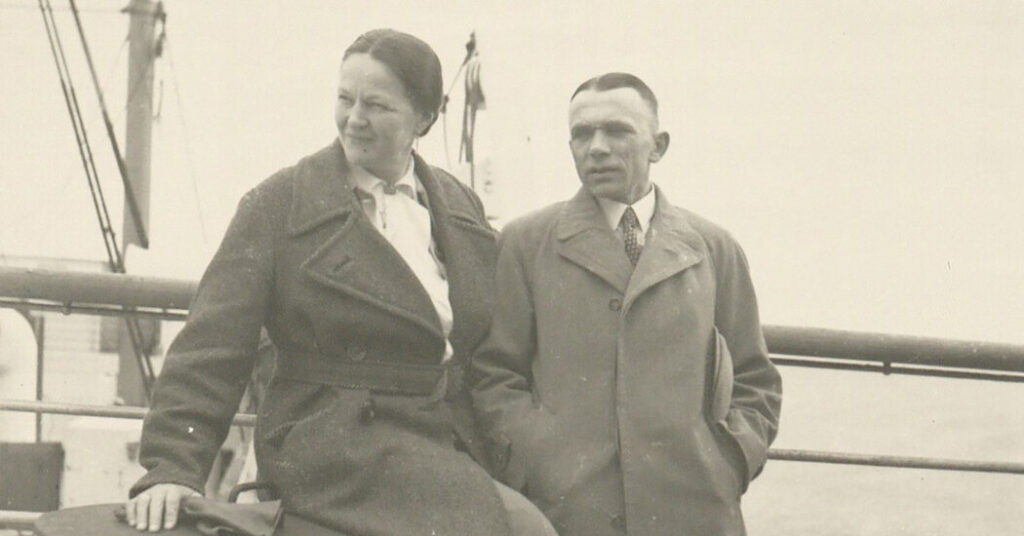FAMILY OF SPIES: A World War II Story of Nazi Espionage, Betrayal, and the Secret History Behind Pearl Harbor, by Christine Kuehn
Like plants, family secrets come in different varieties. Common secrets include a long-past affair; the exotic variant might involve a second family. An invasive secret, on the other hand, is one that takes over and changes the meaning of the family itself. And discovering that your aunt and grandparents were Nazi spies definitely falls under this category.
Christine Kuehn had a close, loving relation with her father, Eberhard — a fact with which the author begins her astonishing “Family of Spies.” The tall, imposing Eberhard still spoke with traces of a German accent, but described his family’s move to Hawaii in the 1930s only “in vague, whitewashed snippets.”
That Eberhard had been previously married and had two older sons was a fact that did not impinge much on young Christine’s happy life, though when her half brother once paid an unexpected visit, she remembers her father ushering the young man swiftly away, instructing him, “Don’t say anything about my family — they don’t know.”
It turned out that Christine and her mother knew little of Eberhard’s early life. His tales of having fought in World War II in the South Pacific were true; what they omitted was the profound gulf between his own wartime experiences and those of his parents, Otto and Friedel, and his half sister, Ruth.
These three Kuehns had remained loyal to the “Fatherland” — and had been dispatched by Joseph Goebbels to Hawaii in order to collect intelligence on the American naval fleet. Under the guise of running a steel company, Otto Kuehn steadily fed information to Japanese contacts to aid in an attack on Pearl Harbor. Another Kuehn son, Leopold, remained in Germany, moving from the position of Nazi storm trooper to that of a high-ranking official in Goebbels’s Ministry of Propaganda; he died at the very end of the war, defending Berlin.
Kuehn balances the story of her own dawning comprehension of her relatives’ Nazi activity with that of the Kuehn family’s time in Hawaii — a life of wealth, glamour and tropical island comfort that abruptly turned, after the bombing of Pearl Harbor, into a series of arrests, internment camps, trials and imprisonment. The family returned to Germany (without Eberhard) in 1945, in a prisoner-of-war swap.
Christine Kuehn first learned all this in 1994, when she received a letter from a filmmaker who said he was writing a script about World War II and was interested in her grandfather’s Nazi activities. She initially assumed he was mistaken — until her father called her back, sobbing. She would spend the ensuing decades poring over F.B.I. records, scholarly histories and family documents — and, eventually, meeting her German cousins.
“Family of Spies” is an amazing and gripping tale, full of suspenseful twists and cinematic details — though it must be said that Otto Kuehn’s espionage efforts were characterized by a fundamental sloppiness that might have been almost comical, had the consequences not been so dire. The family’s lifestyle was so lavish that it attracted the attention of local gossip columnists — and, ultimately, the feds. The F.B.I. agent Robert Shivers amassed a cache of damning evidence — mysterious funds, stashes of binoculars, a specially-built window from which to flash light signals to waiting Japanese ships — but while the United States was still in peacetime, his hands were tied.
The most colorful — and notorious — Kuehn spy was certainly Ruth, the product of Friedel’s first marriage, to a Jewish architect. As a teenager, Ruth joined the girls’ wing of the Nazi youth group, campaigned for Hitler and had an affair with Goebbels. When the family moved to Hawaii, her ability to charm American servicemen became a valuable asset. Yet, after repatriating to Germany in 1945, Ruth ultimately returned to the United States, married and successfully buried her history, telling the author, in their one meeting, “You have a good life,” and “You don’t need to know about the family, the past or Pearl Harbor.”
As the story hurtles toward Dec. 7, 1941, the book acquires page-turning urgency. Kuehn’s research brings the lead-up to vivid life, then the devastation of the attack itself. And, ultimately, there is the catharsis of seeing Otto, Friedel and Ruth apprehended by F.B.I. agents.
Eberhard Kuehn, then 15, was repeatedly questioned until he finally convinced his interrogators of what he had insisted from the start: A mere boy, he had played no part in his family’s espionage activities. That Eberhard enlisted when still underage to fight alongside fellow Americans seems unsurprising for a young man scarred by all he had witnessed — even if it meant he might fight the very enemy to whom his own parents and sister had remained loyal. And, of course, keep their secrets for life.
FAMILY OF SPIES: A World War II Story of Nazi Espionage, Betrayal, and the Secret History Behind Pearl Harbor | By Christine Kuehn | Celadon | 237 pp. | $29.99
The post A Secret Defined Her Life. She Had No Idea. appeared first on New York Times.




